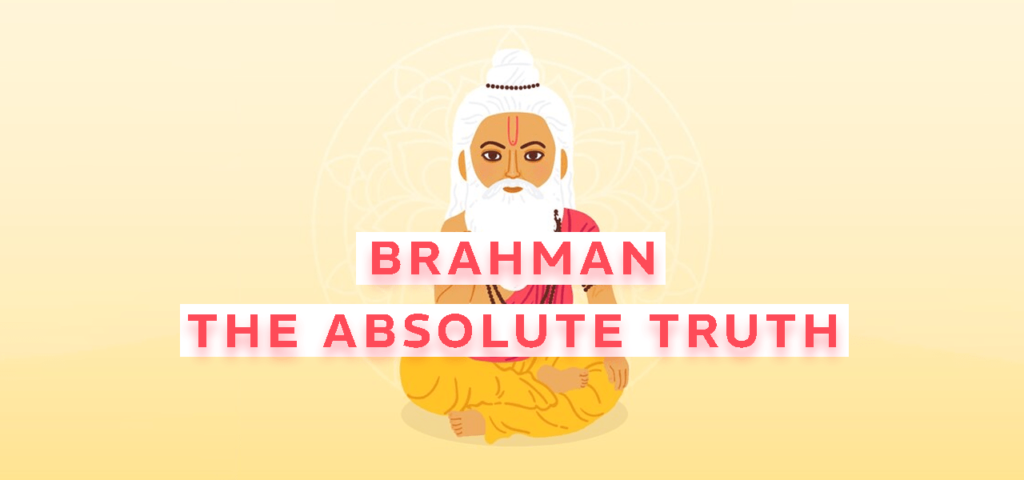The metaphysical concept of the Absolute Truth has extensively been discussed in various ancient scriptures of Hindus.
Brahman (not to be confused with Brahma – one of the three faces of the Hindu Trinity) is said to be the Ultimate Reality – the unchanging truth behind ever changing phenomenal world. He is the blissful divine energy behind all creation. He is the creator of the universe who includes the universe within His own being. He is said to be that in which all beings are born, by which they live ; and by which, while departing, they enter. He is the essence of all that exists. He is the One, without a second. He is the indivisible pure consciousness, which is all-pervading. He is Pramatman – the Supreme Self.
Though Himself beyond any limiting concepts of time and space, the Eternal supports the cosmic manifestation in time and space. Though causing all the activity in the material world, He Himself does not act. Though causing all the changes in the universe, He Himself is beyond any change. He remains unaffected by the cosmic experiences.
He is the single binding unity behind all the diversity. Being self-existent, He does not need any support for existence. He is the eternal light in all beings.
Vedanta studies Reality simultaneously in two spheres namely the external world and the internal nature. As per the Advaita (non-dualistic) school of Vedanta philosophy, which is the most widely accepted worldview in Hinduism, Brahman is identical to the Atman. He is all-pervading. Nothing can be without Him and nothing can be beyond Him.
Though described in the Upanishads in negative terms (na iti, na iti), not this, not this ; Brahman is not a negative concept. He is not emptiness. On the other hand, He is the truth behind all creation ; hence, behind all phenomena. He represents wholeness, fullness and completeness because after realising Him, nothing more is left to be realised.
In sacred scriptures, Brahman has been described as sat-chit-anand (eternal truth, eternal consciousness ; and the eternal joy). These states of being are not mere attributes but the essential nature of the Ultimate Reality.
Essential nature of Brahman has been described in chapter thirteen of the Bhagavad Gita. It has been stated that by knowing the Supreme Brahman, which is beginningless and which is said to be neither existent (sat) nor non-existent (asat), one gains the eternal bliss.
It has further been stated that the Supreme Brahman dwells in the world, enveloping all. Though He appears to have the qualities of all the senses, yet He is without any of the senses. He is unattached and yet He is supporting all. He is free from the modes of material nature, yet He is experiencing them.
He is outside and inside of all beings. He is non-moving and also the moving. He is too subtle to be known by the physical senses. He is far away and yet too near. Though appearing as divided among various beings, the Supreme is indivisible. He is the one who is supporting all beings, destroying them ; and creating them afresh. He is beyond any darkness. He is the light of all lights. He is the knowledge, the object of knowledge ; and also the goal of knowledge. He is seated in the hearts of all.
In shloka 8.3, it is stated that Brahman is indestructible and the Supreme (higher than all else). Further, it is stated in shloka 9.4 that the entire universe is pervaded by the Supersoul through His unmanifest form.
In short, Brahman is the only subject and everything else is an object of His experience.
In the holy scriptures, Brahman has variously been described as the Unchanging and also the Unthinkable ; and also the Lord of the universe. He is, thus, stated to be both – the unmanifest and the manifested being. He is the formless and also the one with form. He is both – impersonal reality and the personal God.
These two views are not contradictory to each other. The same reality in its absolute self-existence is Brahman (nirguna Brahman – the Brahman without any attributes) ; and as the Supreme Lord who creates, supports and absorbs all, He is Ishvara, the God (saguna Brahman – the Brahman with attributes).
The universe is created through the union of material and consciousness natures of the Supreme Lord. Ishvara, therefore, is both – the efficient as well as material cause of creation.
Three functions of Ishvara, that of creation, preservation and of dissolution of the universe are represented by three gods namely Brahma, Vishnu and Shiva. These three are essentially one, though perceived in a threefold manner. The avataras and other manifestations of the Absolute also represent nothing else but the Eternal Truth. Thus, the misconception that the Hindus worship many gods is totally uncalled for. They, in fact, believe firmly in one indivisible Supreme.
It is very difficult to define precisely an idea which is beyond the senses, beyond the mind and beyond one’s intelligence. That which is inexplicable cannot be explained by any amount of reasoning and logic. No arguments can prove or disprove the reality of the Supreme. It is only through one’s own spiritual experience that he can himself realise the Eternal Truth.

